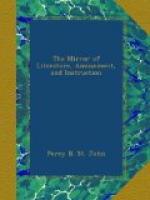are higher and narrower than those of their countrymen
generally. Both are lively and intelligent; they
pay much attention to what is passing around them;
and are very grateful for any little attention that
is paid to them. As a proof of their intelligence,
it may be stated that they learned to play at Draughts
very readily, and were soon able to beat those who
had assisted in teaching them. Their appearance
is perfect health. To their friends and attendants,
and to each other, they are said to be much attached.
They appear to be excellent physiognomists, for they
read the countenance of the visiter readily, and are
easily affronted with any contemptuous expressions.
It is said they have not learnt any manual art beyond
rowing a boat, but they can run and jump, and climb
cracks and rigging with great facility. They
are dressed in short, loose, green jackets and trousers,
the costume of their country, which is very convenient,
and allows the utmost freedom of motion, but does
not show the form of the boys to advantage. With
their arms twined round each other, as they bend down
or move about, they look like a group of statuary.
Dr. Warren, in his report, states that he
never
heard them speak to each other, though they were
very fond of talking with a young Siamese, who was
brought with them as a companion. They, however,
appear to have a means of communication more rapid
than by words. The point most worthy of remark,
in regard to their actions and movements, is, that
they seem, generally speaking, to be actuated but by
one will; and that from whichever of them the volition
of the moment proceeds, it seems imperative upon both.
Occasionally, there is an exception to this remark—as,
on the voyage from Siam to the United States, when
one wanted to bathe, and the other refused, on account
of the coldness of the weather, they quarrelled on
the subject.
Each has a name of his own—the one, Chang,
and the other, Eng; but, when persons wish
to address them as one—to claim their attention
to anything, for example, or to call them—they
are addressed as—Chang Eng.
The union of twins is not an unusual occurrence, and
various anatomical collections present many such objects.
Ambrose Pare relates several instances. Dr. Warren
is, however, of opinion, that the Siamese Boys
present the most remarkable case of the lusus naturae
which has yet been known, taking into view the perfection
and distinctness of organization, and the length of
time they have lived. The whole phenomenon may
be described in a very few words—two
perfect bodies united and bound together by an inseparable
link. As we have already stated, their health
is at present good; but, observes Dr. Warren, “it
is probable that the change of their simple living
for the luxuries they now obtain, together with the
confinement their situation necessarily involves,
will bring their lives to a close within a few years.”




